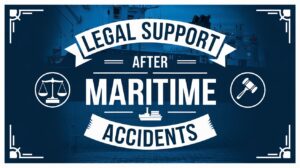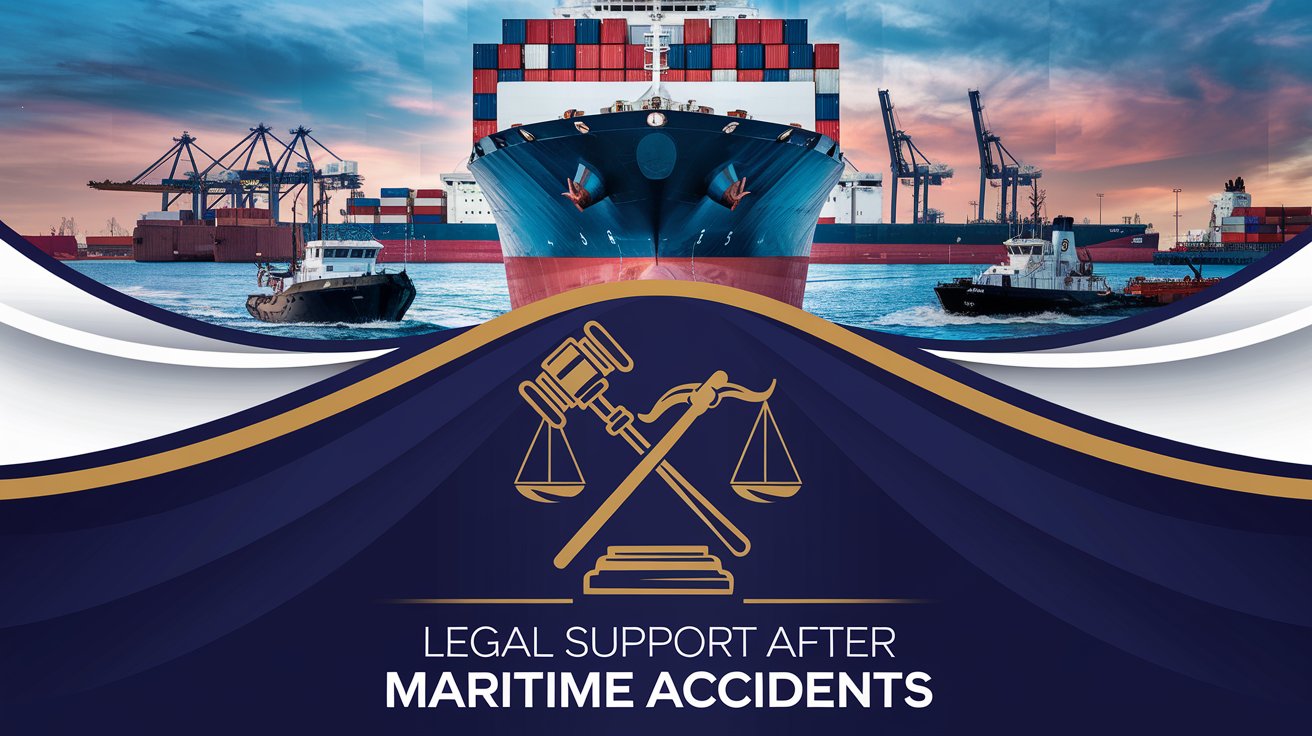The maritime industry is one of the most dangerous fields, with workers regularly facing the risk of accidents, injuries, and fatalities. In Houston, where offshore drilling and shipping are prominent industries, maritime accidents are a common occurrence. These accidents often result in serious injuries that require long-term medical treatment, time off work, or even permanent disabilities. In such situations, a maritime accident lawyer can be invaluable in helping injured workers navigate complex legal waters and maximize their compensation.
Maritime law, also known as admiralty law, is a specialized area of law that governs activities and incidents on navigable waters. This legal field can be intricate, often involving multiple parties and regulations that protect maritime workers. A maritime accident lawyer in Houston is uniquely positioned to help injured workers understand their rights, pursue compensation, and hold responsible parties accountable.
Understanding Maritime Law and Workers’ Rights
Maritime law is different from standard state and federal laws that govern land-based workers. It includes various legal frameworks designed to protect offshore workers, dockworkers, and seamen, including the Jones Act, the Longshore and Harbor Workers’ Compensation Act (LHWCA), and the Death on the High Seas Act (DOHSA).
The Jones Act allows injured maritime workers to sue their employers for negligence. This law is particularly beneficial because it provides broader compensation than standard workers’ compensation claims. However, to succeed under the Jones Act, the injured worker must prove that the employer’s negligence contributed to the accident. This can be a daunting task, but an experienced maritime accident lawyer can gather the necessary evidence to prove liability.
In contrast, the LHWCA applies to workers injured on navigable waters or adjacent areas, such as docks or shipyards. The act provides medical care, wage replacement, and rehabilitation services for injured workers, regardless of fault. However, the LHWCA has strict eligibility requirements, and understanding whether a worker qualifies can be complicated.
The DOHSA allows families of workers who die in international waters due to a wrongful act or negligence to seek compensation for their losses. Maritime accident lawyers play a crucial role in helping families secure justice and financial support after the tragic death of a loved one.
Investigating the Maritime Accident
One of the most important ways a maritime accident lawyer in Houston can help maximize compensation is by conducting a thorough investigation into the accident. Accidents at sea can be complex, involving multiple factors such as faulty equipment, unsafe working conditions, negligence on the part of the employer or crew members, or violations of safety regulations.
A lawyer will work with a team of experts, such as accident reconstruction specialists, engineers, and safety inspectors, to gather crucial evidence that supports the injured worker’s case. This evidence may include:
- Maintenance records for the vessel or equipment involved in the accident.
- Safety logs showing whether the employer complied with federal safety regulations.
- Testimony from coworkers or witnesses who observed unsafe practices leading up to the accident.
- Photographs or videos of the accident scene, the vessel, or equipment.
- Medical records documenting the extent of the injuries sustained.
By collecting and analyzing this evidence, the lawyer can build a strong case that proves negligence or unsafe working conditions. This not only increases the chances of securing compensation but also ensures that all responsible parties are held accountable for their actions.
Navigating Legal Complexities
Maritime law is filled with complex regulations and procedures that can be difficult to navigate for someone without legal expertise. A maritime accident lawyer understands the nuances of these laws and can help injured workers avoid common pitfalls that might jeopardize their claim.
For instance, the statute of limitations for filing a maritime injury claim can vary depending on the specific law under which the claim is filed. The Jones Act has a three-year statute of limitations, while claims under the LHWCA must be filed within one year of the injury. Missing these deadlines can result in losing the right to compensation. An experienced lawyer will ensure that all necessary paperwork is filed on time and that the case is handled within the legal deadlines.
Additionally, maritime accident lawyers are familiar with venue selection, meaning they know where to file the claim. This can be important in cases involving injuries that occur on international waters or in disputes between different jurisdictions. Choosing the correct venue can significantly impact the outcome of the case and the amount of compensation received.
Negotiating with Insurance Companies
After a maritime accident, injured workers often face an uphill battle when dealing with insurance companies. Insurance adjusters are trained to minimize payouts, offering settlements that do not reflect the full extent of the victim’s damages. They may try to downplay the severity of the injuries, blame the worker for the accident, or pressure the worker into accepting a low settlement quickly.
A maritime accident lawyer in Houston can handle all negotiations with insurance companies, ensuring that the worker does not accept a lowball offer. Lawyers are skilled in evaluating the true value of a claim, taking into account factors such as medical expenses, lost wages, rehabilitation costs, and long-term disabilities. By negotiating on behalf of the injured worker, the lawyer can push for a fair settlement that covers both current and future expenses.
If negotiations with the insurance company fail to result in a reasonable offer, the lawyer can take the case to court and present the evidence before a judge or jury. This litigation process puts pressure on the insurance company to offer a more favorable settlement to avoid the cost and risk of a trial.

Maximizing Compensation for Injured Workers
A maritime accident lawyer is dedicated to ensuring that injured workers receive the maximum compensation possible for their injuries. Compensation in maritime injury cases can cover a wide range of damages, including:
- Medical Expenses: This includes hospital bills, surgeries, medications, physical therapy, and any other medical costs related to the injury. Maritime accidents often result in severe injuries, such as traumatic brain injuries, spinal cord injuries, burns, and broken bones, which require extensive medical treatment.
- Lost Wages: Injured workers are often unable to return to work immediately after an accident. In cases of permanent disability, the worker may never be able to return to their previous job. A maritime accident lawyer will seek compensation for both lost wages and loss of earning capacity, ensuring that the worker is financially secure even if they cannot return to work.
- Pain and Suffering: Maritime accidents can cause significant physical pain and emotional distress. Compensation for pain and suffering accounts for the victim’s physical injuries, emotional trauma, and the long-term impact on their quality of life.
- Disability and Rehabilitation: In cases where the injury results in permanent disability, the worker may require ongoing rehabilitation, assistive devices, or home modifications. A lawyer will include these future expenses in the compensation claim to ensure that the worker is not left with out-of-pocket costs.
- Wrongful Death: In the tragic event that a maritime accident results in a worker’s death, the family may be entitled to compensation through a wrongful death claim. Compensation can cover funeral expenses, loss of financial support, and the emotional toll on surviving family members.
Advocating for Workers’ Rights
Maritime workers have the right to a safe working environment, and employers are legally obligated to follow safety regulations that protect their employees. Unfortunately, many maritime employers prioritize profits over safety, cutting corners on maintenance, training, and equipment upkeep. This negligence can lead to devastating accidents that leave workers injured or killed.
A maritime accident lawyer serves as a fierce advocate for injured workers, holding employers accountable for their actions. By filing lawsuits, maritime lawyers send a message to the industry that safety violations and negligence will not be tolerated. This not only helps the injured worker secure compensation but also encourages employers to improve safety standards, protecting other workers from future accidents.
Conclusion
Maritime accidents can be life-altering, leaving victims with serious injuries and financial hardships. Navigating the legal process after a maritime accident is complex, requiring a deep understanding of maritime law, insurance negotiations, and the various regulations that govern offshore work. A maritime accident lawyer in Houston has the expertise needed to guide injured workers through this process and maximize their compensation.
By conducting thorough investigations, navigating legal complexities, negotiating with insurance companies, and advocating for the rights of injured workers, a maritime accident lawyer ensures that victims receive the compensation they deserve. Whether through a settlement or a court verdict, these attorneys play a critical role in helping injured maritime workers rebuild their lives after a devastating accident.





